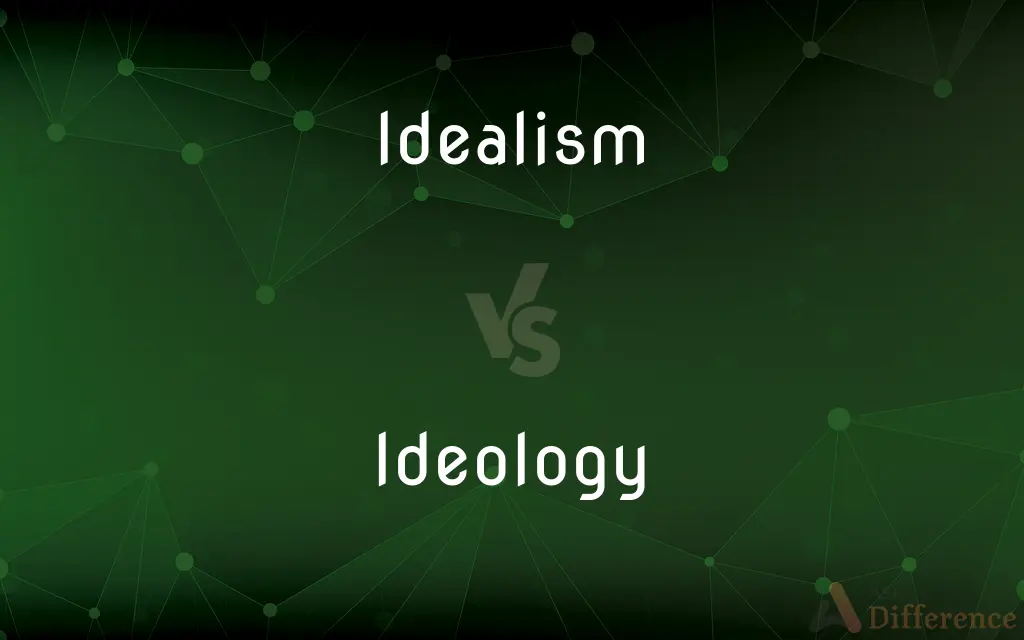Idealism vs. Ideology — What's the Difference?

Difference Between Idealism and Ideology
ADVERTISEMENT
Compare with Definitions
Idealism
In philosophy, idealism is a diverse group of metaphysical views which all assert that "reality" is in some way indistinguishable or inseparable from human perception and/or understanding, that it is in some sense mentally constructed, or that it is otherwise closely connected to ideas. In contemporary scholarship, traditional idealist views are generally divided into two groups.
Ideology
An ideology (/ˌʌɪdɪˈɒlədʒi/) is a set of beliefs or philosophies attributed to a person or group of persons, especially as held for reasons that are not purely epistemic, in which "practical elements are as prominent as theoretical ones." Formerly applied primarily to economic, political, or religious theories and policies, in a tradition going back to Karl Marx and Friedrich Engels, more recent use treats the term as mainly condemnatory.The term was coined by Antoine Destutt de Tracy, a French Enlightenment aristocrat and philosopher, who conceived it in 1796 as the "science of ideas" to develop a rational system of ideas to oppose the irrational impulses of the mob. In political science, the term is used in a descriptive sense to refer to political belief systems.
Idealism
The unrealistic belief in or pursuit of perfection
The idealism of youth
Ideology
A set of doctrines or beliefs that are shared by the members of a social group or that form the basis of a political, economic, or other system.
Idealism
Any of various systems of thought in which the objects of knowledge are held to be in some way dependent on the activity of mind.
ADVERTISEMENT
Ideology
Doctrine, philosophy, body of beliefs or principles belonging to an individual or group.
A dictatorship bans things, that do not conform to its ideology, to secure its reign.
Idealism
The act or practice of envisioning things in an ideal and often impractical form.
Ideology
(uncountable) The study of the origin and nature of ideas.
Idealism
Pursuit of one's ideals, often without regard to practical ends.
Ideology
The science of ideas.
Idealism
Idealized treatment of a subject in literature or art.
Ideology
A theory of the origin of ideas which derives them exclusively from sensation.
Idealism
(Philosophy) The theory that the object of external perception, in itself or as perceived, consists of ideas.
Ideology
A set or system of theories and beliefs held by an individual or group, especially about sociopolitical goals and methods to attain them; in common usage, ideology is such a set of beliefs so strongly held by their adherents as to cause them to ignore evidence against such beliefs, and thus fall into error - in this sense it is viewed as a negative trait; contrasted to pragmatism, and distinct from idealism.
Idealism
The property of a person of having high ideals that are usually unrealizable or at odds with practical life.
Ideology
An orientation that characterizes the thinking of a group or nation
Idealism
The practice or habit of giving or attributing ideal form or character to things; treatment of things in art or literature according to ideal standards or patterns;—opposed to realism.
Ideology
Imaginary or visionary theorization
Idealism
(philosophy) An approach to philosophical enquiry, which asserts that direct and immediate knowledge can only be had of ideas or mental pictures.
Idealism
The quality or state of being ideal.
Idealism
Conception of the ideal; imagery.
Idealism
The system or theory that denies the existence of material bodies, and teaches that we have no rational grounds to believe in the reality of anything but ideas and their relations.
Idealism
The practice or habit of giving or attributing ideal form or character to things; treatment of things in art or literature according to ideal standards or patterns; - opposed to realism.
Idealism
A belief in the feasibility of the implementation of ideal principles and noble goals, and the practice or habit of pursuing such goals; - opposed to realism and cynicism.
Idealism
(philosophy) the philosophical theory that ideas are the only reality
Idealism
Impracticality by virtue of thinking of things in their ideal form rather than as they really are
Idealism
Elevated ideals or conduct; the quality of believing that ideals should be pursued
Share Your Discovery

Previous Comparison
Lacrimal vs. Lachrymal
Next Comparison
Thimbleberry vs. Raspberry













































